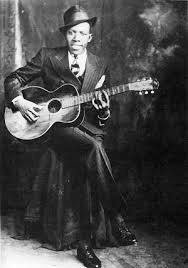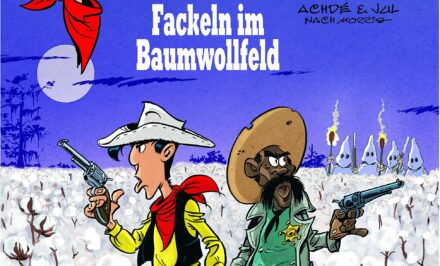Singing the U.S.A. Blues
The ‘banality of injustice’
An echo of the Battle of The Bogside
by Thomas Adcock
Copyright © 2014 – Thomas Adcock
NEW YORK,near America
How striking are parallels between the small city of Ferguson, Missouri, in this August of 2014, and the small city of Derry, Northern Ireland, back in August of 1969. How similar the sorrows, how kindred the festering tribulations, how obscene the homicides.
We may call the inevitable violence in Ferguson the same as a recent chapter of Northern Ireland’s bloody history: “The Troubles.” At opposite ends of an ocean, two peoples have suffered and died. Each place and time mark crossroads, in which citizens must find the path that secures their own lives and avoids destruction of civil society.
To help us along the troubled journey, brothers and sisters, let us sing a chorus of the blues—in the sweet-sad hope of saving our souls:
I went to the crossroad, fell down on my knees,
Asked the Lord above,
„Have mercy. Now save poor Bob, if you please.“
Standin‘ at the crossroad, tried to flag a ride—
Didn’t nobody seem to know me, babe, everybody pass me by.
Standin‘ at the crossroad, baby, risin‘ sun goin‘ down,
I believe to my soul, now—poor Bob is sinkin’ down.
The great American blues artist Robert Johnson was a mere twenty-seven years old when he passed in 1938. Through music—the foregoing are lyrics from “Crossroads,” his landmark 1936 composition—he made us feel what hurt him and, by extension, those who have ever felt discouraged, dispossessed, demoralized, or disrespected; those who have ever longed for help, if even from the unresponsive mystery of Heaven. Which means all of us. Tears and loss and aloneness and the terrors of regret are the universally dark corners of human existence.
Small wonder that “Crossroads” was sung by the anguished Irishers of Derry in ’69—those scratching by in the majority Roman Catholic slum known as The Bogside, where they were shot in the cobbled streets by British soldiers of the hated Royal Ulster Constabulary. Today, “Crossroads” is sung in the African American churches of Ferguson—and other black churches throughout the United States, where congregants grieve over another of their own shot in the street by a white policeman.
At one time or another, and wherever in the world they are, a grieving people dealt great injustice hunger for the poetry of catharsis, which is the blues.
•••
Two-thirds of Ferguson’s twenty-one thousand people are African American. But the city has long been ruled by a white power structure, currently led by the clueless Mayor James Knowles III, who declared—on the day after Officer Darren Wilson executed an unarmed young black man named Michael Brown—that his town is free of “racial divide.” Furthermore, said Mayor Knowles, everybody in Ferguson agrees with him on this point.
Black people of Ferguson may see a mirror image of their situation in the town of Derry, Northern Ireland. Black people understand how unresolved tensions between a majority of poor Irish Catholics and a wealthy Protestant minority ruling class, loyal to the crown of England, corroded a community, and a nation; how that corrosion sparked violence that horrified the world; how in August of 1969 Derry was ripe for explosion. They understand Derry precisely as they understand Ferguson: emblematic of unresolved socio-economic tensions, sparks that burn in a country that invented the gag about a classless society.
As the world knows, Ferguson exploded when Officer Wilson pumped bullets into the right arm, torso, and skull of eighteen-year-old the late Mr. Brown—who was not under arrest, but nevertheless stood in surrender position with his hands up, according to several eyewitnesses; whose character was promptly slimed by the white police chief of Ferguson, as a means of persuading the public that this young black man surely deserved death; whose killer with a badge violated established rules of procedure involving the use of deadly force.
Two weeks after Mr. Brown’s death, the Pulitzer Prize-winning journalist Isabel Wilkerson published an essay in The Guardian of London, in which she summoned the “banality of evil” thesis explored by German-born political theorist Hannah Arendt (1906-1975) in the latter’s reportage during the 1961 trial, in Israel, of Nazi SS-Obersturmbannführer Adolf Eichmann.
 “The banality of injustice,” Ms. Wilkerson wrote of the repetitious executions black men at the hands of white police officers, is a “predictable playing out of 21st Century convention: the swift killing, the shaming of the victim rather than inquiry into the shooter, the kitchen-table protest signs, Twitter handles, and spontaneous symbols of grievance—whether hoodies or Skittles or hands in the air, the spectacle of death by skin color.”
“The banality of injustice,” Ms. Wilkerson wrote of the repetitious executions black men at the hands of white police officers, is a “predictable playing out of 21st Century convention: the swift killing, the shaming of the victim rather than inquiry into the shooter, the kitchen-table protest signs, Twitter handles, and spontaneous symbols of grievance—whether hoodies or Skittles or hands in the air, the spectacle of death by skin color.”
•••
Forty-five years ago this month, grievances of seventeenth century vintage boiled over in Derry, giving birth to three decades of Na Trioblóidí, as “The Troubles” is understated in the Irish tongue.
 The spark: Catholic lads from a slum called Taobh an Bhogaigh (The Bogside), adjacent to the central walled city of Derry, took whatever they could get their hands on—stones, nails, bottles—and pelted a gang of drunken braggarts marching through their ghetto and bellowing an ancient slogan of local provocation: “No Surrender!” Occasion for communal riot was the annual “Apprentice Boys” parade, a tribal commemoration of successful resistance to what a gang of Protestant working lads of the year 1689 called “the armies of Popery” laying siege to English-ruled Derry. Thus, the “Battle of The Bogside.”
The spark: Catholic lads from a slum called Taobh an Bhogaigh (The Bogside), adjacent to the central walled city of Derry, took whatever they could get their hands on—stones, nails, bottles—and pelted a gang of drunken braggarts marching through their ghetto and bellowing an ancient slogan of local provocation: “No Surrender!” Occasion for communal riot was the annual “Apprentice Boys” parade, a tribal commemoration of successful resistance to what a gang of Protestant working lads of the year 1689 called “the armies of Popery” laying siege to English-ruled Derry. Thus, the “Battle of The Bogside.”
Soon enough in Derry of the more recent time, August of 1969, police officers backed by the British Army restored a dubious order with intimidating displays of the latest in infantry hardware, tear gassings, rubber bullets, and beatings of residents and journalists who dared to do their duty. Among the Bogsiders was Bernadette Devlin—a heroine born the same year as I, and a woman I am privileged to know. In her autobiography, “The Price of My Soul,” she wrote of chaos that consumed Derry back in ‘69:
[T]he police trucks came, dozens and dozens of them. …The roaming convoys travelled with headlights blazing, and the whole area was brightly and eerily lit…The noise was terrible. Indoors, everyone tuned their radios on full blast, or played rebel songs at full volume on record-players, and people were singing the Internationale, and “We Shall Overcome.”
[T]he police were roaming ‘round in totally undisciplined bands. A party of them went into one house, claiming to have seen someone run into it, and senselessly beat up everyone in the house. Others were going ‘round saying, “If you see Bernadette Devlin, get her!” and “If you see Mary Holland, stone her to death!” For they don’t like Mary Holland: she writes nasty things about them, and takes it all down in shorthand.
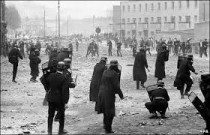 And so, The Troubles began. They spread throughout Northern Ireland, the British colony known as Ulster, southward through the Irish Republic, and even to London itself. During a notable subsequent flare-up on the 30th of January 1972—an assault known as Domhnach na Fola (Bogside Massacre), once again targeting the disenfranchised majority of Derry—the British army shot fourteen men dead, half of them teenagers. Two Bogsiders were severely injured when tanks ran over their limbs.
And so, The Troubles began. They spread throughout Northern Ireland, the British colony known as Ulster, southward through the Irish Republic, and even to London itself. During a notable subsequent flare-up on the 30th of January 1972—an assault known as Domhnach na Fola (Bogside Massacre), once again targeting the disenfranchised majority of Derry—the British army shot fourteen men dead, half of them teenagers. Two Bogsiders were severely injured when tanks ran over their limbs.
When horror died of exhaustion, in the late 1990s, the tally was this: two thousand civilians dead, and debilitating casualties among the living numbered at forty-eight thousand.
The British media were quick to label Ms. Devlin, an energetic participant in the August 1969 Battle of The Bogside, as being “no angel.” Forty-five years later, the New York Times, the touchstone of American journalism, saw fit to point out that Michael Brown was likewise “no angel.”
At the age of twenty-one, Bernadette Devlin was elected as an independent socialist to represent an Ulster constituency in the Parliament at London. Her term at Westminster, from 1969 until 1974, was interrupted by a brief stretch in jail on conviction of incitement to riot in Derry. In January of 1981, she and her husband, Michael McAliskey, were nearly murdered on account of their continuing activism in the cause of human rights.
Three masked gunmen shot the couple numerous times at their home in Coalisland, County Tyrone—in front of their two children. The would-be assassins were noisy about it: after cutting telephone wires to the house, they used a sledgehammer to break down the front door. British soldiers assigned to guard the Devlin-McAliskey home somehow failed to see or hear any of it.
Ms. Devlin traveled frequently to the United States—on one occasion for an evening reception at my home in New York. She was still in pain from gunshot wounds. No matter, she spoke of a gritty brand of patriotism: “We were born into an unjust system,” she said. “We are not prepared to grow old in it. To gain that which is worth having, it may be necessary to lose everything else.”
In 2003, the shameful presidential administration of George W. Bush barred Ms. Devlin from entering America at the port of New York. According to Colin Powell, the U.S. Secretary of State that year, the fifty-six-year-old former member of the British Parliament, wounded veteran of human rights crusades, and mother of two posed “a serious threat to the security of the United States.”
•••
I tell the abbreviated tale of Bogside, and that of dear Bernadette, to suggest infectious heroism. In Ferguson, too, there will emerge people dedicated to long-term struggle for the betterment of their city and nation. There come heroes and heroines, the sort of men and women unwilling to grow old in an unjust place.
And to be sure, they have begun arriving—to try their hands at soothing the public temper in the raw wake of yet another unarmed young black man shot dead by yet another white cop.
The nation’s chief law enforcement officer traveled to Ferguson on August 20 to tell a personal tale to those attending a community meeting.
 “I am the attorney general of the United States, but I am also a black man,” said Eric Holder. (Such painful use of but as qualifier.) He added, “I can remember being stopped on the New Jersey turnpike on two occasions, and accused of speeding. Pulled over. …’Let me search your car’…Go through the trunk of my car, look under the seats and all this kind of stuff. I remember how humiliating that was, and how angry I was, and the impact it had on me.”
“I am the attorney general of the United States, but I am also a black man,” said Eric Holder. (Such painful use of but as qualifier.) He added, “I can remember being stopped on the New Jersey turnpike on two occasions, and accused of speeding. Pulled over. …’Let me search your car’…Go through the trunk of my car, look under the seats and all this kind of stuff. I remember how humiliating that was, and how angry I was, and the impact it had on me.”
On August 17, the presence of Ron Johnson was a blessing on the men and women and children—black and white—gathered at the Greater Grace Church for a Ferguson unity rally. Mr. Johnson, a captain with the Missouri Highway Patrol tasked by the state’s governor to take over command from what we now know to be an inept and brutal and callous municipal police department, stepped to the altar. First, he addressed the late Michael Brown’s mother and father, and others in a mourning family.
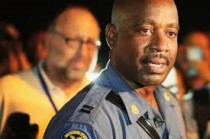 “I am sorry,” said Captain Johnson. “I wear this uniform, and I should say that I am sorry. You are my family, friends. And I am you. I will stand to protect you—“ He turned to the congregation, and said, “—to protect your right to protest.”
“I am sorry,” said Captain Johnson. “I wear this uniform, and I should say that I am sorry. You are my family, friends. And I am you. I will stand to protect you—“ He turned to the congregation, and said, “—to protect your right to protest.”
In response, the congregation shouted, “Amen!”
“The last twenty-four hours have been tough for me,” the captain continued. “I did an interview last night and the reporter said, ‘Something’s wrong. Your tone has changed. Are you tired? Is something bothering you?’ I said my heart is heavy.”
Finally, said Ron Johnson, whose calm and fatherly demeanor brought an immediate peace to Ferguson when he strode through streets filled with maddened residents, “When this is over, I’m going to go to my son’s room. My black son. Who wears his pants saggy, his hat cocked to one side, got tattoos on his arms. But that is my baby.”
“Amen!”
Then, at Michael Brown’s funeral on August 25, held at the Friendly Temple Missionary Baptist Church in nearby St. Louis, there came an elderly black man of the type most would never notice. His name was Hilliard Phillips.
Mr. Phillips is a retired postal carrier who delivered mail along Canfield Drive in Ferguson—where Michael Brown was executed by Officer Wilson; where angry residents created a makeshift memorial of candles and flowers; where the officer’s white comrades amused themselves by driving squad cars over the flowers, smashing them, and allowing a police dog to urinate on the candles.
When Mr. Phillips rose to speak, he said an outpouring of love and support for the Brown family might inspire people of good will to take a critical look at the state of race relations in America.
“You can’t really overnight change the behavior of a person,” reaoned Mr. Phillips, “but sometimes they can be coerced in a sweet way.”
They sang the blues these three men. I believe it will later be written that their songs were the beginnings of a bridge to reconciliation; to an acceptance that in America, as the Declaration of Independence tells us the truth, we are all created equal.
•••
Once upon a time, August in America was called the “silly season.” A time when Washington politicians were at their goofiest, Hollywood celebrities at their most perverse, and hordes of Swedish tourists hit the streets of New York in sandals and socks. We could point at these things and laugh ourselves silly.
Americans used to be optimistic in August, that once-upon-a-time season of rest and recreation that allowed us to dream of the best to come with the new frontiers of autumn and winter.
Reflecting on the deadly events in Ferguson this month—and certainly the many other deadly events preceding, the unending wars, and an economy that looks lousy to everybody except politicians and the corporations that own them—New York Times columnist Frank Bruni contributed a downbeat piece to the August 26 op-ed page of his newspaper.
 America, wrote Mr. Bruni, is “a country surrendering to a new identity and era, in which optimism is quaint and the frontier anything but endless…Conventional wisdom has seldom been so useless, because pessimism in this country isn’t usually this durable or profound.”
America, wrote Mr. Bruni, is “a country surrendering to a new identity and era, in which optimism is quaint and the frontier anything but endless…Conventional wisdom has seldom been so useless, because pessimism in this country isn’t usually this durable or profound.”
Among other bases for his dark view, Mr. Bruni cited an opinion poll conducted early this month by the Wall Street Journal and NBC-Television News, which found seventy-six percent of adults in the U.S. convinced that their children will know a considerably poorer life when they come of age. Seventy-one percent of adults, according to the poll, believe the nation is “on the wrong track.” And according to a Gallup survey in July, these are the confidence ratings Americans give to the three branches of the federal government: thirty percent for the Supreme Court, twenty-nine percent for the presidency, seven percent for Congress.
The lousy economy is the least of the factors contributing to a melancholy mood, Mr. Bruni contends. More importantly, he wrote, “It’s about fear. It’s about impotence.”
I might add that the impotent will happily subscribe to fear. Not so the bold resisters—my dear Bernadette, and Eric Holder, and Ron Johnson, and sweet old Hilliard Phillips.
Fear has long been a profitable enterprise in America—especially race-based fear, responsible for the world’s tetchiest police officers, and the world’s largest cache of privately owned guns. This would include the fully automatic Uzi machine gun placed in the hands of a nine-year-old girl the other day, on holiday with her moronic parents at a shooting range and restaurant in Arizona called Bullets & Burgers. The poor girl lost control of the Uzi when it recoiled—as weapons that fire six hundred bullets per minute are wont to do—and an employee of Bullets & Burgers was unfortunately shot dead.
On the evening of June 11, 1963—the year in which he was assassinated—President John F. Kennedy addressed the nation on the topic of race-based fear.
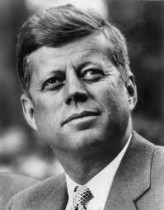 “We face…a moral crisis as a country and a people,” Mr. Kennedy said of racism that sparked explosive uprisings in cities from coast to coast. “It cannot be met by repressive police action…It cannot be quieted by token moves, or talk. It is a time to act in the Congress…and, above all, in our daily lives.” He added, “Those who do nothing are inviting shame, as well as violence. Those who act boldly are recognizing right, as well as reality.”
“We face…a moral crisis as a country and a people,” Mr. Kennedy said of racism that sparked explosive uprisings in cities from coast to coast. “It cannot be met by repressive police action…It cannot be quieted by token moves, or talk. It is a time to act in the Congress…and, above all, in our daily lives.” He added, “Those who do nothing are inviting shame, as well as violence. Those who act boldly are recognizing right, as well as reality.”
A few hours after that speech, Byron de la Beckwith Jr., a proud member of Mississippi’s White Knights of the Ku Klux Klan who crouched out of view in a clump of honeysuckle vines, accosted civil rights leader Medgar Evers outside his home in Jackson and murdered him with a .30-06 Enfield shotgun. Mr. Beckwith was tried in Mississippi courts by two consecutive all-white juries, and twice released as the result of mistrials.
The Klansman was brought to trial once again, in February of 1994. Based on incriminating new evidence obtained during an exhumation of Mr. Evers’ body, a jury of eight blacks and four whites were unanimous in convicting him. Mr. Beckwith died in prison seven years later, eighty years old and unrepentant.
The Enfield model .30-06 shotgun is a collector’s item.
Robert Johnson once sang of the need for wariness—eternal vigilance, as kluxers say. Social progress is measurable in America, and most of us are rightly proud of that. All the same, it is wise to watch out for what we cannot quite see. As Mr. Johnson put it:
I got to keep movin’, I got to keep movin’.
Blues fallin’ down like hail.
Mmm, blues fallin’ down like hail,
And the day keeps on remindin’ me
There’s a hellhound on my trail.
I have a bluesy thought of my own, which I submit to my fellow Americans: I refuse to live in a country like this, and I am not leaving.
Thomas Adcock
— Thomas Adcock is America correspondent for CulturMag

